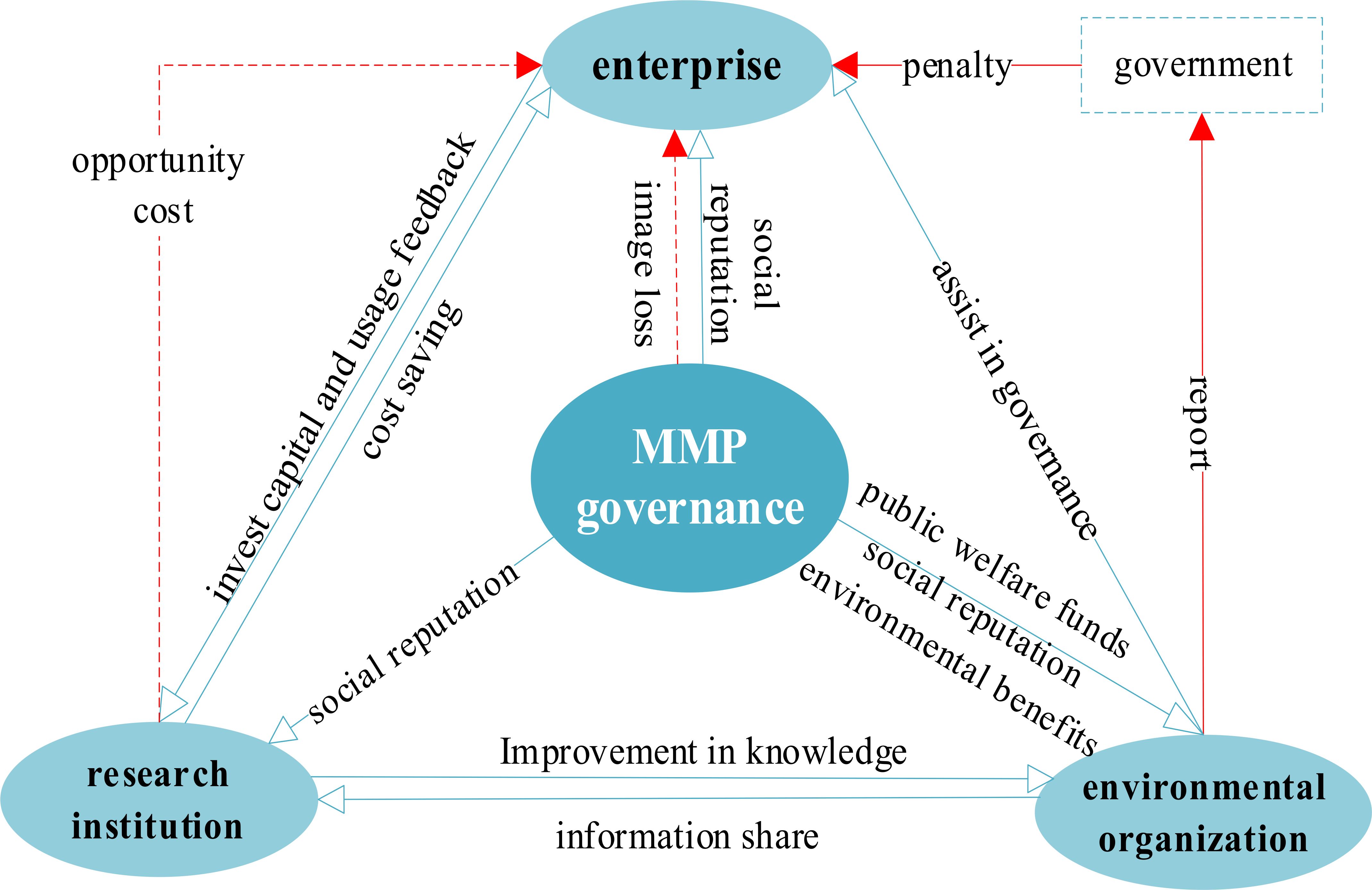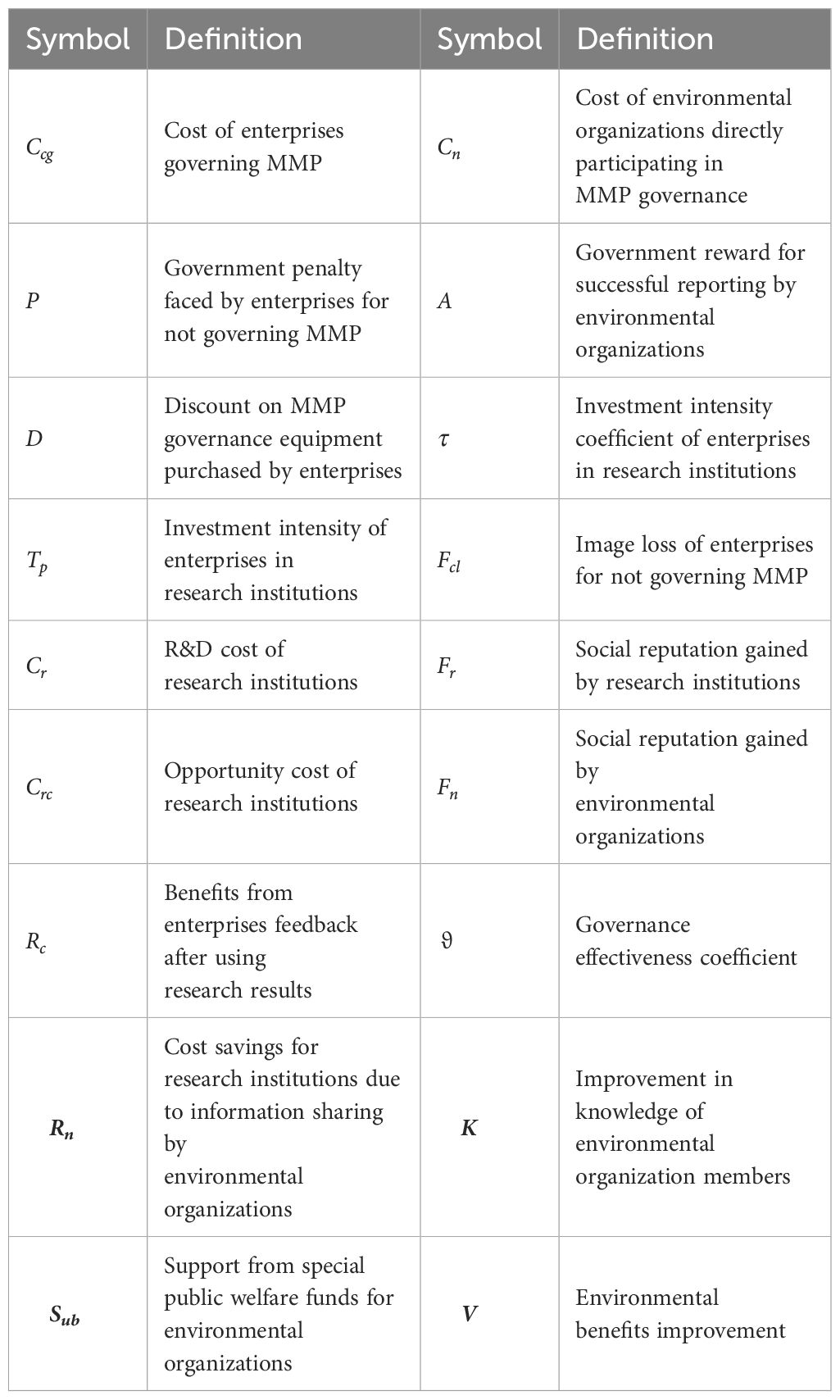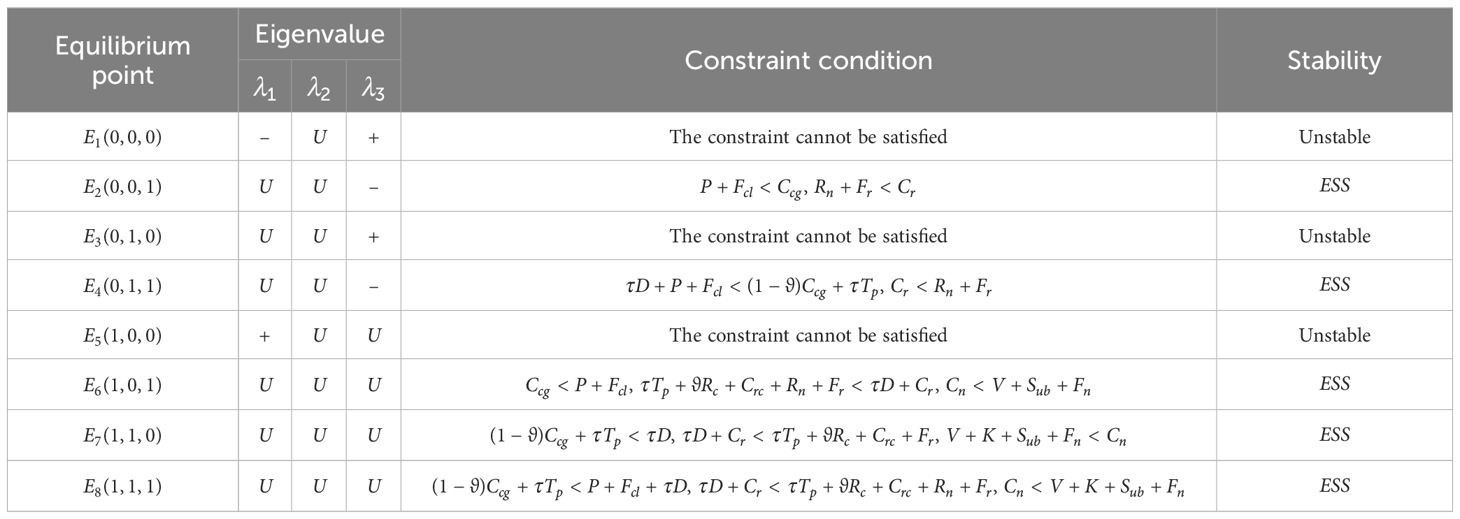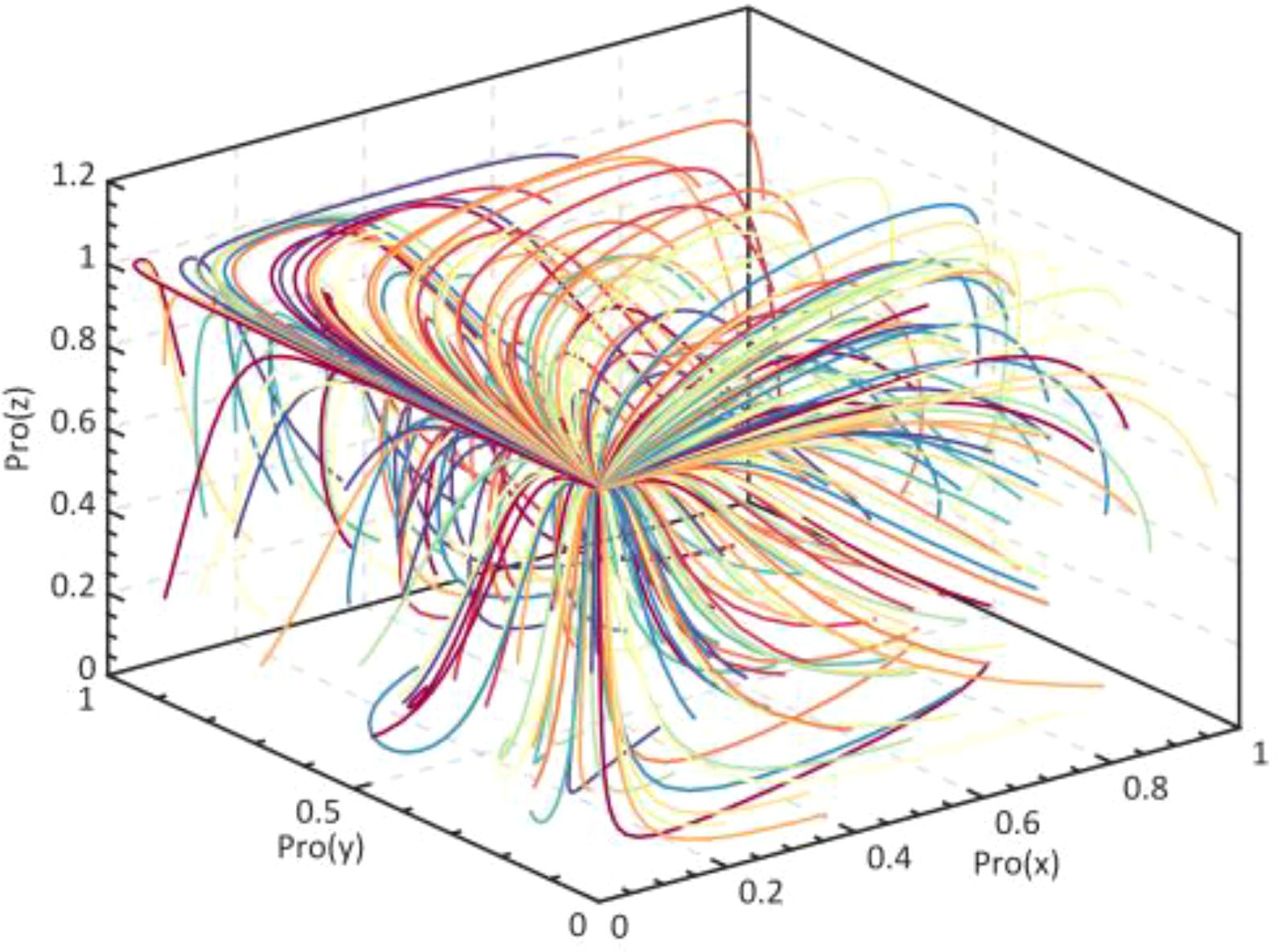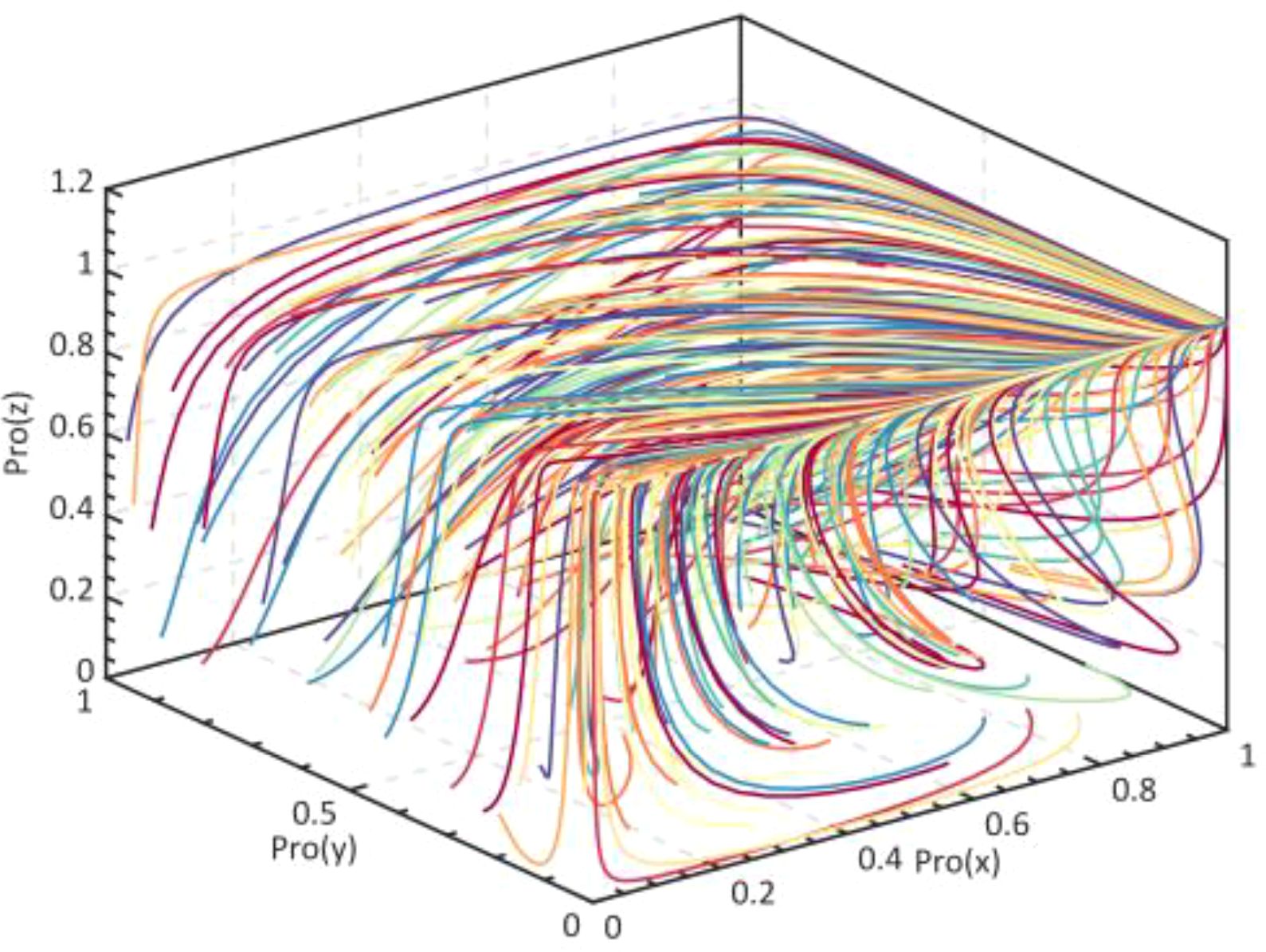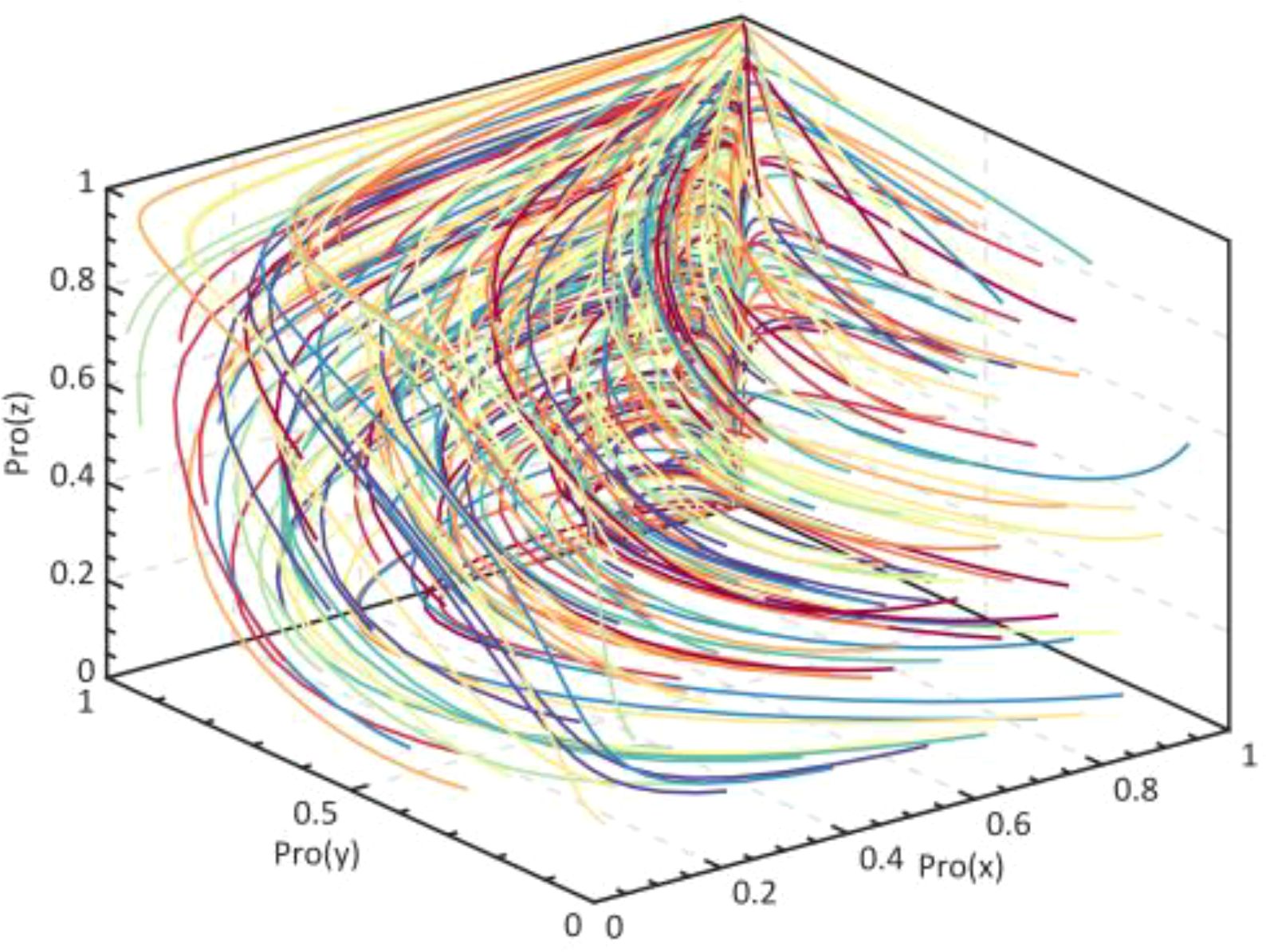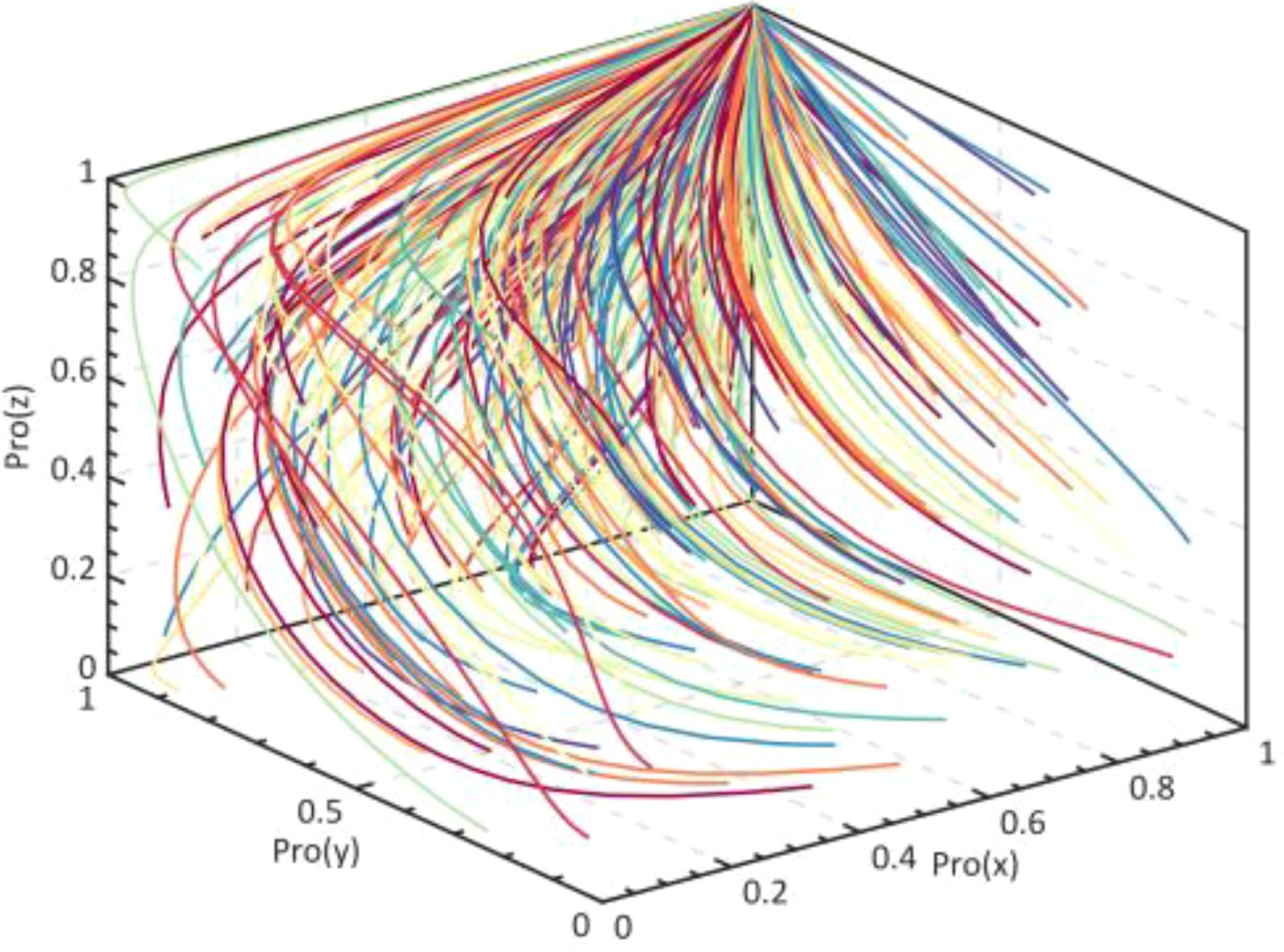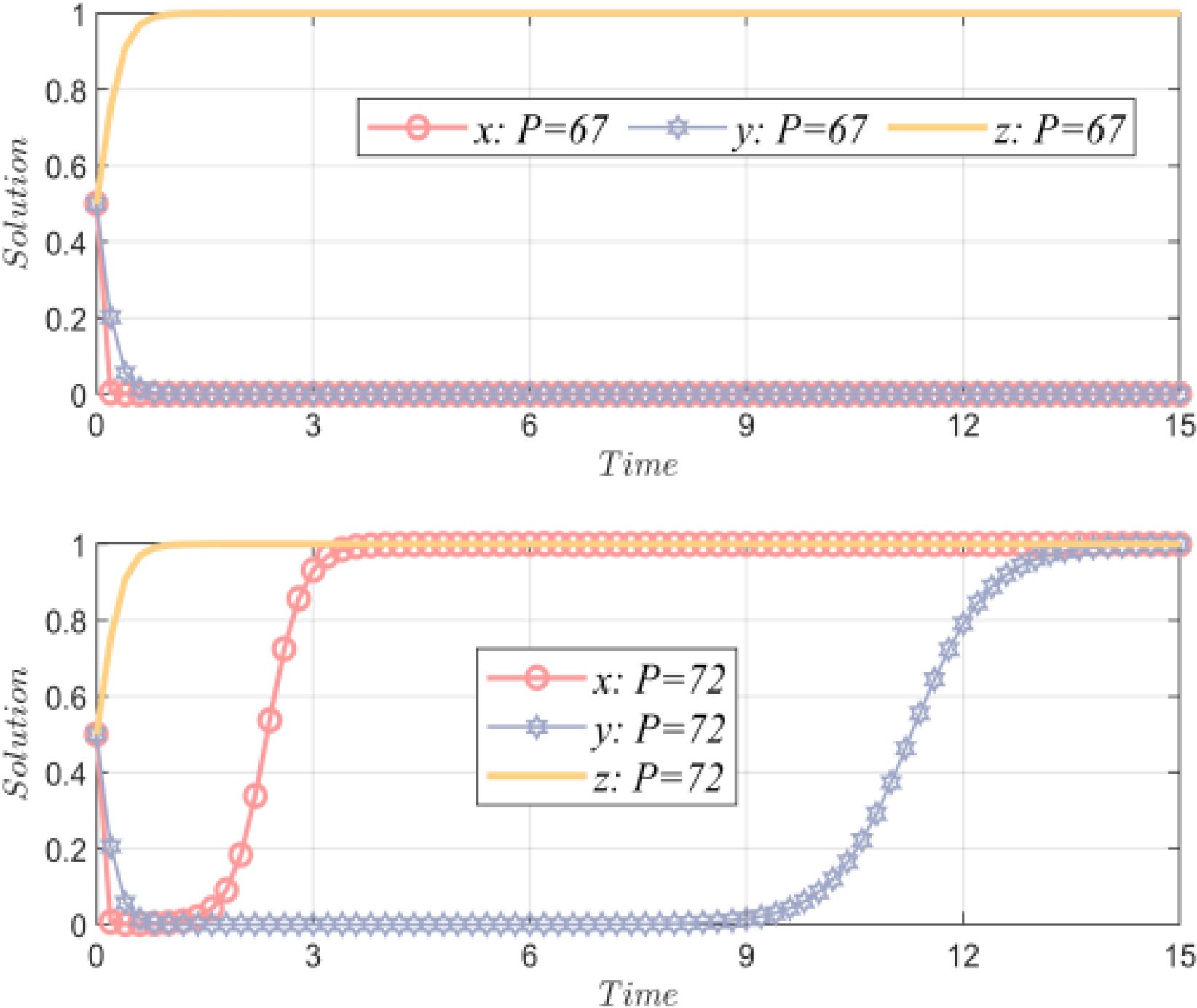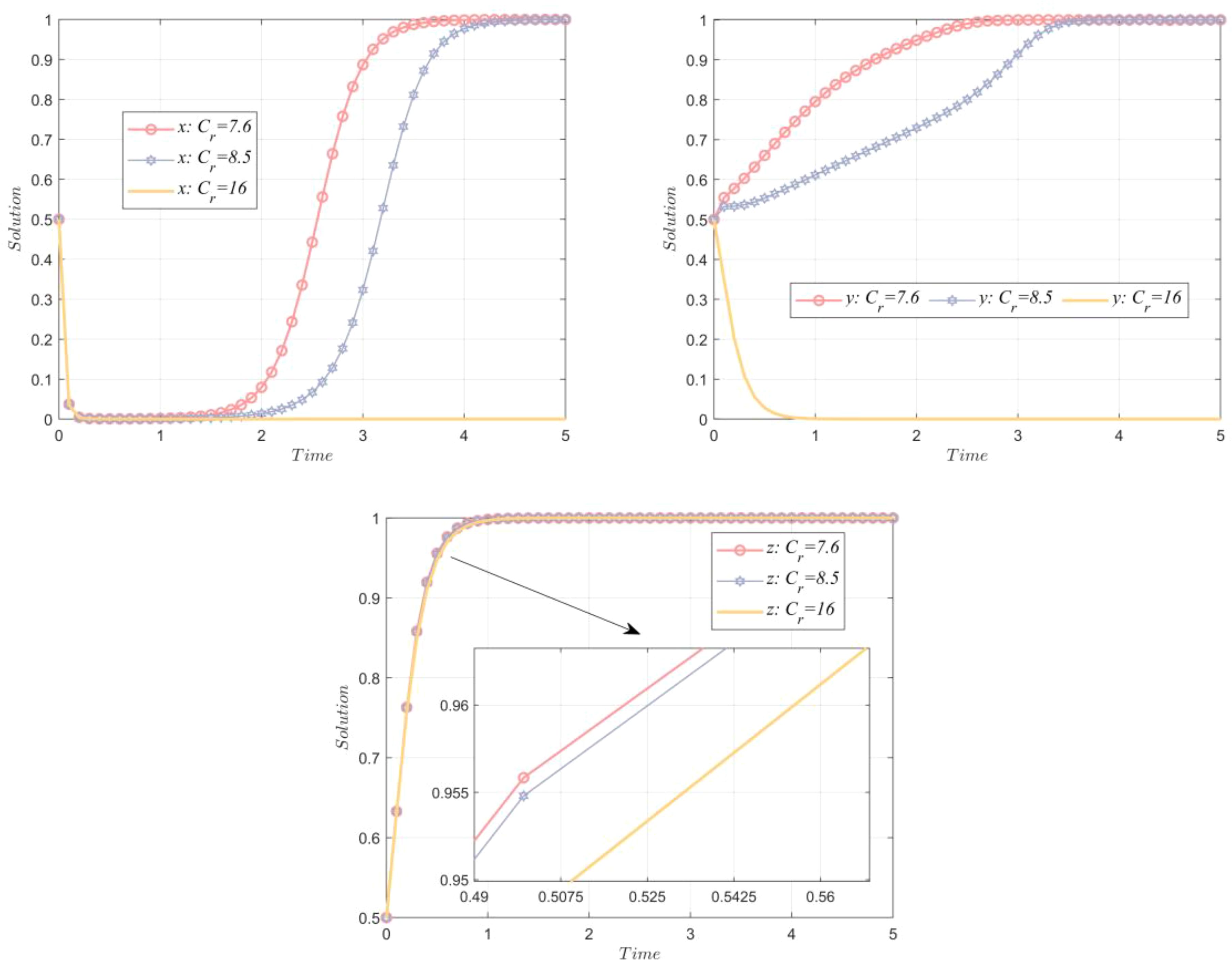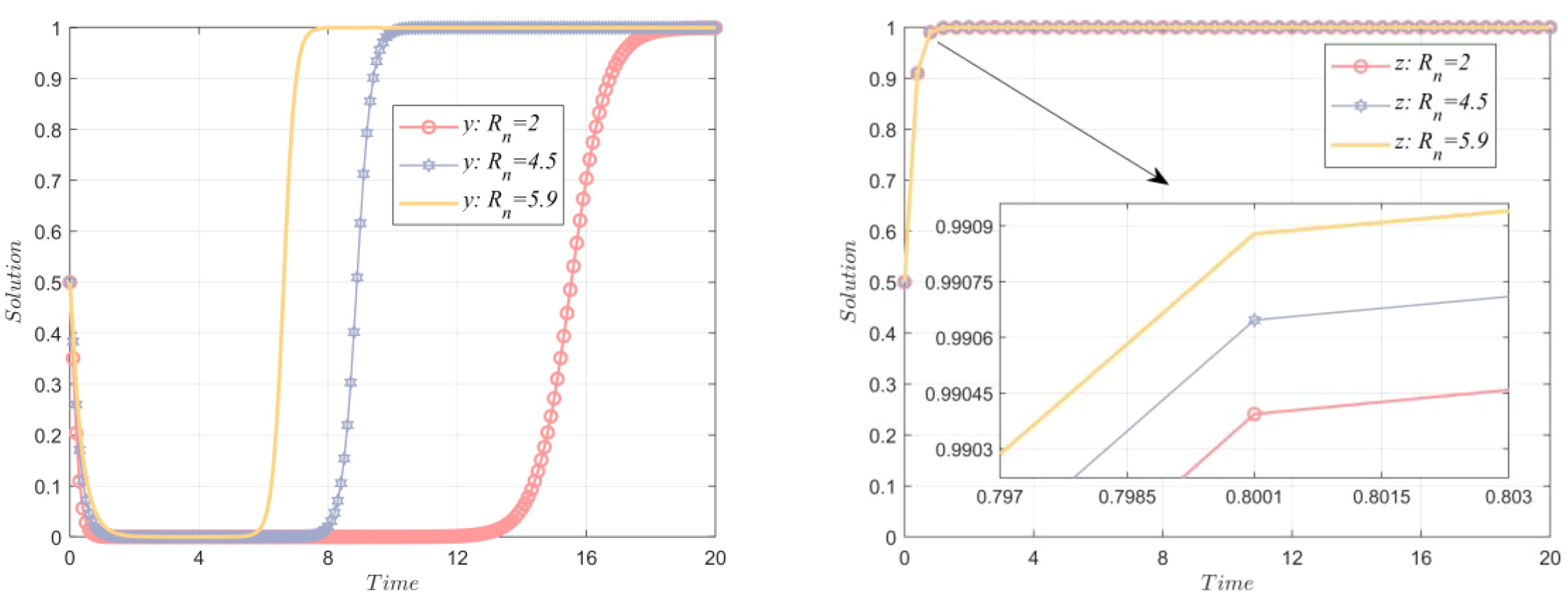- 1School of Economics and Management, Zhejiang Ocean University, Zhoushan, China
- 2Institute of Marine Development, Ocean University of China, Qingdao, China
- 3Business School, University of Shanghai for Science and Technology, Shanghai, China
- 4Department of Construction Management, Dalian University of Technology, Dalian, China
- 5School of Civil Engineering, Nanjing Tech University, Nanjing, China
Introduction: Marine microplastics, are widely distributed in the global marine environment, posing a challenging issue that requires the joint efforts of global stakeholders.
Methods: To effectively address the issue of marine microplastic pollution (MMP) governance and analyze the dynamic changes in governance willingness of various participants under different scenarios, this paper meticulously constructs a game theory framework encompassing polluting enterprises, research institutions, and environmental organizations.
Results: (1) On the political level, the implementation of continuous and strong economic penalty mechanisms is an effective means to deter enterprises from evading MMP governance responsibilities. However, the effective execution of this strategy highly depends on the participation and supervision of environmental organizations. Therefore, it is essential to assign more roles and responsibilities to environmental organizations to ensure the thorough execution of governance measures. (2) On the technical level, the effectiveness of research directly determines the functional status of enterprises and research institutions in the MMP governance decision-making system. Weaker entities tend to make decisions following the behavioral preferences of dominant entities. Thus, deepening the integration of industry and research and fully unleashing the effectiveness of research outcomes in MMP governance is a key path to enhancing overall governance efficiency and effectiveness. (3) On the economic level, high governance costs often become a significant factor limiting the enthusiasm of all parties to participate. However, when innovative cooperation models achieve cost sharing and benefit sharing, the governance willingness of participants significantly increases. It is evident that optimizing resource allocation, improving the efficiency of fund utilization, and establishing a diversified and sustainable funding guarantee mechanism are crucial for advancing the in-depth progress of MMP governance.
Discussion: In summary, this study not only provides profound theoretical insights into the interaction relationships and behavioral choices of multiple stakeholders in MMP governance but also offers practical strategic recommendations for constructing an efficient and collaborative governance system.
1 Introduction
With the increasing frequency of human activities, the consumption of plastic products has continuously increased (Al-Tarshi et al., 2024), and related waste is directly or indirectly discharged into the ocean (Salomone et al., 2023), leading to an increasingly severe issue of marine microplastic pollution (MMP) (Wootton et al., 2022; Thacharodi et al., 2024). MMP has been listed as one of the top ten emerging global environmental issues requiring urgent resolution (Biswas and Pal, 2024). To date, approximately 13 million tons of plastic enter the ocean each year (Xu et al., 2024b). This number is expected to increase to 25.4 million tons by 2025 (Zhang et al., 2024). In the ocean, these plastics gradually degrade into marine microplastics Marine microplastics are plastic fragments or particles with a diameter of less than 5 mm, characterized by their small size, large quantity, wide distribution, and high hazard (Ugwu et al., 2021). They carry other pollutants and harmful microorganisms into the air, biota, and even the human body, posing threats to human health, marine ecological security, and marine economic development (Wootton et al., 2021; Borriello, 2023; Nohara et al., 2024; Olmo-Gilabert et al., 2024). In response, international organizations such as the United Nations and the European Union, as well as major marine countries like the United States and China, have taken action by signing conventions and agreements to jointly address the MMP issue (Wang et al., 2018; Ambrose, 2021; Gao et al., 2023a), elevating it to the level of global governance (Bigdeli et al., 2022; Joyce et al., 2023). However, as a new type of pollutant, the governance of marine microplastics is still in its infancy (Dar et al., 2024), with many issues such as outdated MMP treatment technologies, unclear stakeholder awareness of MMP, and undefined MMP governance responsibilities. Therefore, promoting industry-research cooperation to enhance the collaborative governance capacity of multiple stakeholders for MMP is of theoretical and practical significance.
Since marine microplastics were officially proposed in 2004 (Thompson et al., 2004), related research has entered a rapid development stage. The international academic community has discussed the sources and distribution of marine microplastics (Kumar et al., 2022; Ribó et al., 2023; Tümerkan et al., 2024). After reaching a basic consensus on the understanding of marine microplastics, the research focus has gradually shifted to the fine monitoring, flux estimation, migration mechanisms, and risk assessments of marine microplastic pollution on ecosystems and human health (Chen, 2020; Chen et al., 2023; Meng et al., 2024; Praved et al., 2024; Tümerkan et al., 2024). Further discussions on MMP governance have been conducted from perspectives such as fishing net recycling, wastewater treatment, microbial genetic engineering, legal improvements, and the participation of citizens and scientists (Freeman et al., 2020; Gong and Xie, 2020; Kurniawan et al., 2023; Liotta et al., 2024). In fact, the formation mechanism of MMP is complex, its entry into the ocean is extensive, responsibility is unclear, control scenarios are diverse, and the damage is intergenerational. Its governance is essentially a process of evolutionary games involving multiple entities, including governments, enterprises, research institutions, and environmental organizations. Among them, enterprises are the direct emitters of MMP, making it necessary for enterprises to manage MMP at the source (Chen et al., 2024). MMP is a technology-intensive governance issue (Gao et al., 2023b), and the monitoring, risk assessment, and exploration of alternative materials for marine microplastic pollutants all rely on scientific research and technological innovation. Research institutions, as major contributors to theoretical research and technological innovation in MMP governance, are indispensable governance entities. Environmental organizations have inherent advantages in improving MMP governance efficiency, with rich human resources, abundant funds, and strong appeal. Many large international environmental organizations, such as the Ocean Protection Society (OPS), have played significant roles in marine environmental protection (Ahmad-Kamil et al., 2024). In the practical governance of MMP, due to imperfect coordination mechanisms of responsibilities and benefits, enterprises, research institutions, and environmental organizations face issues of insufficient motivation to participate, leading to challenges in collaborative governance. Unfortunately, most existing studies reveal the objective laws of MMP and innovations in governance technology from the natural sciences perspective (Anthony et al., 2023; Kharraz et al., 2024), with little focus on the preferences of stakeholders from a social sciences perspective. Furthermore, although some studies involve the responsibility of stakeholders, they primarily focus on the government, enterprises, and the public, with limited attention to research institutions and environmental organizations, and lack in-depth discussion on the evolution of collaborative governance strategies among stakeholders in the MMP governance process.
This paper attempts to answer the following research questions: (1) How do the behavioral strategies of enterprises, research institutions, and environmental organizations as micro stakeholders evolve under complex interactions? (2) Under what conditions can the returns of all parties evolve stably towards a macro scenario of collaborative governance? (3) How can the deep coordination between enterprises and research institutions be promoted from the perspective of industry-research integration to better facilitate MMP governance? To address these questions, this paper uses evolutionary game theory, an important research tool for clarifying complex game relationships and strategy evolution paths, to deeply analyze the complex interwoven relationships and dynamic strategy evolution trajectories formed by enterprises, research institutions, and environmental organizations in the collaborative governance process of MMP. Specifically, the marginal contributions of this paper are mainly reflected in the following aspects:
(1) Breaking through the traditional focus on single enterprises or simple binary relationships, this paper innovatively incorporates research institutions and environmental organizations into the MMP governance research framework. It re-examines and enriches the theoretical system and practical path of MMP governance from the dual perspectives of deep industry-research integration and external promotion by environmental organizations. This shift in perspective not only enhances the comprehensiveness and depth of the research but also provides more diverse and flexible ideas for solving MMP governance challenges.
(2) This paper particularly emphasizes the dynamic changes in the dominant relationships and decision sequences between enterprises and research institutions under different governance scenarios. This analysis deeply reveals the key impacts of power structures, information flows, and benefit distribution on governance effectiveness. By detailing these scenario factors, this work broadens the application boundaries of the evolutionary game theory method in this field and provides scientific evidence for formulating more precise and effective governance strategies.
(3) Through the construction and analysis of game models, this paper deeply explores the strategy interactions and evolution trends of enterprises, research institutions, and environmental organizations under different scenarios, extracting a series of forward looking and operational management insights and policy recommendations. These insights not only provide guidance for stakeholders on how to make optimal decisions in a complex and changing governance environment but also offer valuable references for governments and related departments to design new mechanisms and models for multi-stakeholder collaborative governance, effectively promoting MMP governance towards a more efficient and sustainable direction.
The remaining organization of this paper is as follows: Section 2 focuses on explaining the principles of model assumptions and parameter settings, constructing the game model through the game matrix between the three stakeholders. Section 3 reveals the evolutionary paths and stable strategies of the three stakeholders in the collaborative governance process of marine microplastic pollution under different scenarios by analyzing the asymptotic stability of the equilibrium points. Section 4 uses MATLAB 2020a software for simulation and analyzes the sensitivity of key parameters. Section 5 summarizes the research conclusions of this paper and proposes relevant management implications based on these conclusions.
2 Basic assumptions and model construction
This paper focuses on the decision making system composed of enterprises, research institutions, and environmental organizations. In MMP governance, participating entities are all of bounded rationality, making it difficult to make optimal choices at the initial stage but instead continuously adjusting and improving strategies based on maximizing their own interests. Evolutionary game theory (EGT), as an important tool for clarifying complex game relationships and strategy evolution pathways under the influence of three parties, does not require participants to be fully rational nor does it require complete information. It combines game theory analysis with the analysis of dynamic evolutionary processes and has been widely applied to marine environmental governance research in recent years (He and Zhang, 2023; Zhang et al., 2023; Zheng et al., 2024). Therefore, the bounded rationality assumption of evolutionary game theory is more in line with the actual situation of strategy changes affecting each other among the entities in MMP governance. The interactions of interests and behavioral influences among these entities form the dynamic game relationship is shown in Figure 1.
2.1 Basic assumptions and parameter setting
Evolutionary game theory studies the decision-making of behavioral agents based on the assumptions of bounded rationality and learning mechanisms, meaning that agents gradually improve their strategies through a certain period of learning to achieve a stable equilibrium outcome. Therefore, it is assumed that enterprises, research institutions, and environmental organizations are all bounded rational decision-makers: the probability that enterprises choose to govern is x, the probability of choosing not to govern is , . The probability that research institutions choose to actively research and develop (R&D) is y, and the probability of choosing passive R&D is , . The probability that environmental organizations choose to focus and participate is z, and the probability of choosing to ignore is , . The complete parameter settings are shown in Table 1. The key parameters and their related basis and explanations are as follows:
Hypothesis 1: Drawing from the research of some scholars (Xiao et al., 2019; Wang and Huang, 2020), it is known that many enterprises and research institutions adopt discount mechanisms when cooperating. If enterprises provide funding to research institutions to promote their research and innovation, the institutions will offer a certain discount when selling related outcomes to the enterprises . This discount is related to the investment intensity coefficient of the enterprises.
Hypothesis 2: When enterprises engage in governance, environmental organizations will assist them in directly participating in MMP governance. The environmental organizations will incur certain governance costs and simultaneously reap the benefits of environmental improvement . If enterprises do not engage in governance and environmental organizations pay attention and participate, the organizations, due to their own limitations, will not choose to govern MMP alone but will instead report the issue to government departments. According to (Li and Jiang, 2023), the government should adopt active regulatory strategies for environmental pollution governance, through which enterprises will face government penalties and damage to their reputation . But if enterprises do not govern and environmental organizations also choose to ignore regulatory frameworks, due to the difficulty in monitoring marine microplastics, the non-governance behavior of enterprises will be hard for the government to detect (Yan and Cao, 2024).
Hypothesis 3: Paying attention to and participating in MMP governance is the mission and vision of environmental organizations (Scrich et al., 2024). When they choose this strategy, they will win social acclaim , increase the organization’s visibility, and receive more support from special public welfare funds (Blackwatters et al., 2023; Newig et al., 2023).
Hypothesis 4: When enterprises choose to govern and research institutions actively conduct research, the institutions will incur research and development costs and receive investment from the enterprises . If enterprises choose to govern but the research institutions are passive in their research, the institutions will incur opportunity costs .
Hypothesis 5: In the case of environmental organization participation, if research institutions actively conduct research, the theoretical research outcomes they achieve will enhance the cognitive abilities of the members of the environmental organizations . The research institutions will also gain a certain social reputation for fulfilling their social responsibilities . The participation of environmental organizations will help research institutions save on research costs (Jorgensen et al., 2021).
Hypothesis 6: When research institutions actively conduct research, the scientific results they achieve can help enterprises reduce the costs of MMP governance (Yang and Yuan, 2024). The better the governance effects of the research equipment, the lower the governance costs for enterprises (Mofokeng et al., 2024). In this case, the practical outcomes of the research institutions will receive positive feedback from enterprises , enhancing the social reputation of the research institutions and bringing them certain benefits (Qian et al., 2023).
2.2 Game model construction
2.2.1 Game model for enterprises
The expected profit of an enterprise choosing to govern MMP is , the expected profit of not to govern MMP is , and the average expected profit is . The expected profit of an enterprise choosing to govern MMP is:
The expected profit of an enterprise choosing not to govern MMP is:
The average expected profit of an enterprise is:
From this, the replicator dynamic equation for the enterprise’s behavioral strategy is:
2.2.2 Game model for research institutions
The expected profit of a research institution choosing to actively research is , the expected profit of passively researching is , and the average expected profit is . The expected profit of a research institution choosing to actively research is:
The expected profit of a research institution choosing to passively research is:
The average expected profit of a research institution is:
From this, the replicator dynamic equation for the research institution’s behavioral strategy is:
2.2.3 Game model for environmental organizations
The expected profit of an environmental organization choosing to focus on and participate in MMP governance is , the expected profit of ignoring MMP governance is , and the average expected profit is . The expected profit of an environmental organization choosing to focus on and participate in MMP governance is:
The expected profit of an environmental organization choosing to ignore MMP governance is:
The average expected profit of an environmental organization is:
From this, the replicator dynamic equation for the environmental organization’s behavioral strategy is:
Based on the above replicator dynamic equations, the game matrix between enterprises, research institutions, and environmental organizations is derived as shown in Table 2.
3 Stability analysis
By simultaneously solving the replicator dynamic equations, , , ,the following pure strategy equilibrium points are obtained: , , , , , , , . These eight equilibrium points are located at the boundaries of the solution of the game, collectively forming the game solution domain.
The derivatives of the replicator dynamic equations for enterprises, research institutions, and environmental organizations are as follows:
3.1 Asymptotic stability analysis
From Equations 13 to 15, we know that when , , , , and are the stable strategies that enterprises, research institutions, and environmental organizations should adopt in the evolutionary process.
3.1.1 Asymptotic stability analysis for enterprises
From Equation 13, we know that the boundary line of the stable state is given by: , If:
Then, , . So is the stable strategy, meaning that the enterprise’s choice to govern MMP is stable, and the choice not to govern MMP is unstable. Conversely, if:
Then, , . So is the stable strategy, meaning that the enterprise’s choice not to govern MMP is stable, and the choice to govern MMP is unstable.
3.1.2 Asymptotic Stability Analysis for Research Institutions
From Equation 14, we know that the boundary line of the stable state is given by: , If:
Then, , . So is the stable strategy, meaning that the research institution’s choice to actively research is stable, and the choice to passively research is unstable. Conversely, if:
Then, , . So is the stable strategy, meaning that the research institution’s choice to passively research is stable, and the choice to actively research is unstable.
3.1.3 Asymptotic stability analysis for environmental organizations
From Equation 15, we know that the boundary line of the stable state is given by: , If:
Then, , . So is the stable strategy, meaning that the environmental organization’s choice to focus on and actively participate is stable, and the choice to ignore is unstable. Conversely, if:
Then, , . So is the stable strategy, meaning that the environmental organization’s choice to ignore is stable, and the choice to focus on and actively participate is unstable.
3.2 System stability analysis
According to the research conclusions of Ritzberger (Ritzberger and Weibull, 1995), when studying the asymptotic stability of evolutionary games, it is only necessary to discuss pure strategy points. Therefore, this paper only needs to discuss the eight pure strategy equilibrium points that satisfy , , . According to the research conclusions of Friedman (Friedman, 1998), when the eigenvalues of the matrix are all less than 0, it indicates that the equilibrium point is asymptotically stable. Therefore, this paper uses the local stability of the system’s Jacobian matrix to determine its evolutionary stable strategy. The Jacobian matrix is as follows:
In the formula, , , . , , . , , .
According to Equation 22, the eigenvalues for each equilibrium point (Table 3), local stability, and conditions (Table 4) can be obtained. As shown in Table 4, under any circumstances, , and are always unstable points of the system. This indicates that when either the enterprise or the research institution participates in governance, the environmental organization will maintain a high level of participation. The decision-making system is stable under the following five scenarios if the corresponding constraint conditions are met. Scenario 1: As shown in Figure 2, when and , the equilibrium point is stable. At this point, the government penalty and image loss faced by enterprises for not governing MMP are lower than the cost of governing MMP, and the cost savings for research institutions due to information sharing by environmental organizations and the social reputation gained by research institutions are lower than the R&D costs of research institutions. The combined strategy for MMP governance manifests as the state where enterprises do not govern, research institutions engage in passive R&D, and environmental organizations focus and participate. The outcome of this strategy combination is relatively poor, and marine microplastic pollution is not effectively governed.
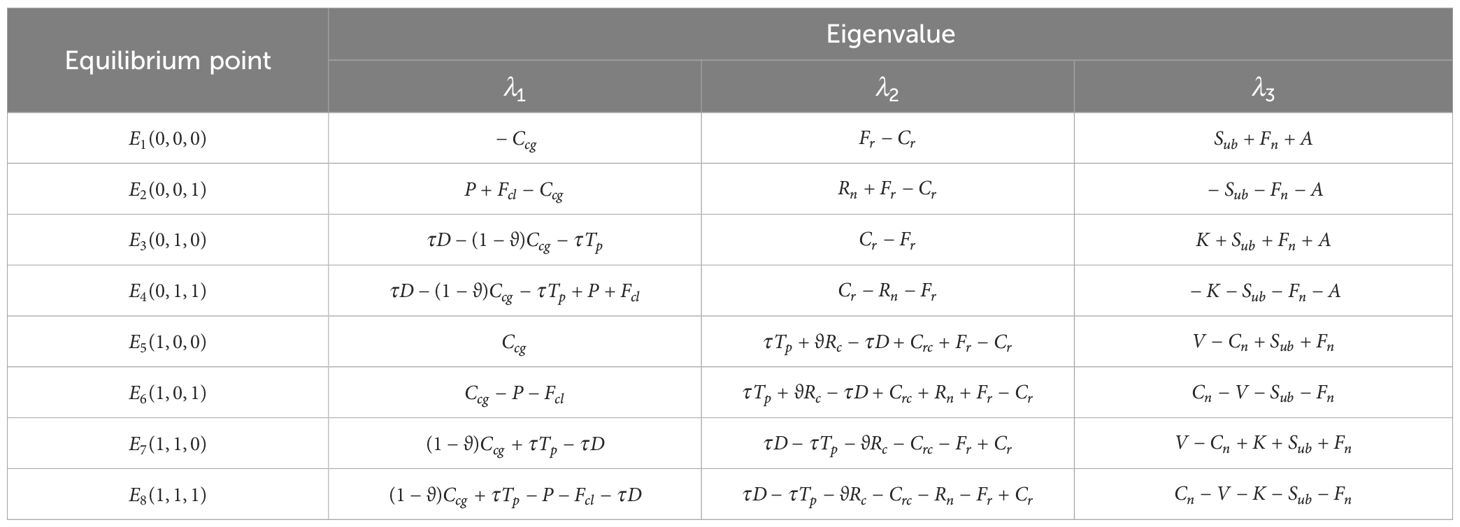
Table 3. Jacobi matrix eigenvalues (enterprises, research institutions, environmental organizations).
Scenario 2: As shown in Figure 3, when and , the equilibrium point is stable. At this point, the discount on MMP governance equipment purchased by enterprises, the government penalty, and the image loss faced by enterprises for not governing MMP are lower than the investment intensity of enterprises in research institutions and the governance cost for enterprises using the research institutions’ equipment. Additionally, the R&D costs of research institutions are lower than the social reputation gained by research institutions and the cost savings for research institutions due to information sharing by environmental organizations. The combined strategy for MMP governance manifests as the state where enterprises do not govern, research institutions actively engage in R&D, and environmental organizations focus and participate.
Scenario 3: As shown in Figure 4, when , , , the equilibrium point is stable. At this point, the cost for enterprises to govern MMP is lower than the government penalty and image loss faced by enterprises for not governing MMP. The investment intensity of enterprises in research institutions, feedback benefits for enterprises from using research results, opportunity costs of research institutions, cost savings for research institutions due to information sharing by environmental organizations, and the social reputation gained by research institutions are all lower than the R&D costs of research institutions and the discount on MMP governance equipment purchased by enterprises. Additionally, the cost for environmental organizations to directly participate in MMP governance is lower than the support from special public welfare funds, social reputation, and the environmental benefits gained by environmental organizations. The combined strategy for MMP governance manifests as the state where enterprises govern, research institutions engage in passive R&D, and environmental organizations focus and participate.
Scenario 4: As shown in Figure 5, when , , , the equilibrium point is stable. At this point, the governance cost for enterprises using research institutions’ equipment and the investment intensity in research institutions are lower than the discount on MMP governance equipment purchased by enterprises. The discount on MMP governance equipment purchased by enterprises and the R&D costs of research institutions are lower than the investment intensity of enterprises in research institutions, feedback benefits for enterprises from using research results, opportunity costs of research institutions, and the social reputation gained by research institutions. Additionally, the support from special public welfare funds for environmental organizations, the improvement in the knowledge of environmental organization members, the enhancement of environmental benefits, and the social reputation gained by environmental organizations are all lower than the cost for environmental organizations to directly participate in MMP governance. The combined strategy for MMP governance manifests as the state where enterprises govern, research institutions actively engage in R&D, and environmental organizations ignore.
Scenario 5: As shown in Figure 6, when , , , the equilibrium point is stable. At this point, the governance cost for enterprises using research institutions’ equipment and the investment intensity in research institutions are lower than the discount on MMP governance equipment purchased by enterprises, the government penalty, and the image loss faced by enterprises for not governing MMP. The discount on MMP governance equipment purchased by enterprises and the R&D costs of research institutions are lower than the investment intensity of enterprises in research institutions, feedback benefits for enterprises from using research results, opportunity costs of research institutions, cost savings for research institutions due to information sharing by environmental organizations, and the social reputation gained by research institutions. Additionally, the cost for environmental organizations to directly participate in MMP governance is lower than the support from special public welfare funds, the improvement in the knowledge of environmental organization members, the social reputation gained by environmental organizations, and the enhancement of environmental benefits. The combined strategy for MMP governance manifests as the state where enterprises govern, research institutions actively engage in R&D, and environmental organizations focus and participate.
4 Simulated analysis
In the evolutionary game process among enterprises, research institutions, and environmental organizations, the strategy choices of each party are interrelated and closely connected. Using MATLAB 2020a software, the study conducts simulation analysis on the strategy choices of each party under different scenarios, visualizing the evolutionary process. The initial values are set as follows: , , , , , , , , , , , , , , , , , . Among them, the value of refers to the bid amount of enterprises in marine microplastic pollution research and prevention projects (Rizhao Ecological Environment Bureau, 2024), and the value of refers to the project funds of the National Key R&D Program “Marine Microplastic Monitoring and Ecological Environmental Effect Assessment Technology Research” (The State Key Laboratory of Estuarine and Coastal Sciences, 2017). The value of P draws on the penalty amount for discharging pollutants and waste into the ocean as stipulated in the “Marine Environment Protection Law” (Ministry of Ecology and Environment of the People’s Republic of China, 2023b). The values of and refer to the donation income and business activity costs in the financial audit report of the Shanghai Rendu Ocean NPO Development Center (Shanghai Rendu Marine Public Welfare Development Center, 2024). The value of A refers to the reward amount in the “Hainan Province Ecological Environment Violation Reporting Reward Measures” (Baike, 2020). Due to the lack of specific practical data for other values, this paper refers to the data values in the relevant research of some scholars (Li and Jiang, 2023; Luan et al., 2024; Yan and Cao, 2024).
With the other values unchanged, setting , we obtain the impact of government penalties on the strategy choices of the three parties (Figure 7). The visual representation from the chart shows that as the penalty severity escalates step by step, the system’s final decision steadily converges to , marking a state of comprehensive cooperative governance equilibrium. In this state, environmental organizations exhibit unwavering enthusiasm for participation, with a full participation probability of 1, and the stability of this decision is almost unaffected by changes in penalty severity. This demonstrates the steadfast stance and sustained momentum of environmental organizations in driving environmental governance. In contrast, the strategy adjustments of enterprises and research institutions are particularly sensitive to changes in penalty severity.
Specifically, when the penalty , enterprises almost completely abandon their responsibility for governing MMP, with a probability of 1 for choosing not to govern. This profoundly reveals the insufficiency of low-intensity penalties to deter enterprises, making them inclined to avoid governance costs driven by economic rationality. However, as the P value leaps to 72, there is a significant change in the behavior of enterprises: initially, due to a fluke mentality, enterprises may still maintain a brief wait-and-see attitude, with the probability of governance temporarily dropping and staying low. But over time, the long-term cost considerations brought about by high penalties gradually prevail, and enterprises increasingly recognize the necessity and benefits of governance, thus steadily increasing their governance probability and eventually fully transitioning to active governance. In fact, the situation of low violation costs and high compliance costs is relatively common, leading enterprises to believe that accepting government penalties is more appropriate than managing pollution. Therefore, increasing the violation costs for enterprises will help solve this dilemma (Liu and Dong, 2022). The strategy choices of enterprises as shown in the Figure 7 with the change of P also strongly demonstrate that high-intensity punitive measures combined with the time effect can form a strong positive incentive for enterprises.
When the P value is set at 67, research institutions face a harsh reality: due to the substantial upfront investment required for MMP governance research, lengthy research cycles, and the general lack of governance motivation among enterprises in this low-penalty environment, research institutions often find themselves in a situation with no support, and their willingness to actively engage in R&D plummets, typically adopting a passive R&D strategy. However, as the penalty intensity jumps to a new height of 72, the behavior pattern of research institutions begins to exhibit a subtle synchronization with the strategies of enterprises. Initially, both may experience a brief period of strategy adjustment to adapt to the new environment, characterized by a temporary decline in participation, maintaining a low level. But subsequently, as enterprises increasingly recognize the necessity and urgency of governing MMP and take practical actions, research institutions also see a turning point, with both parties’ decisions gradually converging to 1. However, the change in research institutions lags behind enterprises. This is mainly because research institutions are not the direct targets of government penalties. As the penalty amount increases, compared to the rapid response of enterprises, research institutions are less sensitive to such changes, and the time taken for their stable strategy to converge to 1 is also longer.
With other values unchanged, setting , , we obtain the impact of governance effectiveness on the strategy choices of the three parties. As shown in the Figure 8, as gradually increases, enterprises will choose the governance strategy. When the governance effectiveness is not ideal , enterprises almost immediately abandon the responsibility of governing MMP. When the governance effectiveness is moderate , although enterprises also tend to not govern, this process appears more hesitant, and the time to converge to the non-governance decision significantly lengthens. This indicates that when the governance effectiveness coefficient fluctuates in a low range, it will not fundamentally incentivize enterprises to govern, and the lower the governance effectiveness coefficient, the stronger the inclination of enterprises to adopt a non-governance strategy. Furthermore, when governance effectiveness approaches an ideal state , enterprises’ strategy choices undergo a fundamental shift. Initially, possibly due to considerations of initial investment, enterprises’ willingness to govern slightly decreases; however, as increases, implying that the adoption of governance equipment will significantly reduce enterprises’ governance costs and is expected to bring significant social benefits and brand reputation. These factors jointly drive enterprises’ positive adjustment in governance strategy, ultimately stabilizing at a comprehensive governance decision (probability gradually approaches 1).
Research institutions and enterprises exhibit a high degree of consistency in their strategy choices; however, in terms of response speed, research institutions often lag behind enterprises. This phenomenon profoundly reveals the leading role of enterprises in strategy changes. When governance effectiveness is unsatisfactory or at a moderate level , the probability of research institutions actively engaging in R&D drops to the lowest point. This phenomenon is actually caused by the negative feedback conveyed after enterprises’ practical application. Since the governance equipment provided by research institutions fails to meet expectations in actual use, the negative information feedback from enterprises directly limits the funding channels available to research institutions, thus dampening their enthusiasm for R&D. Conversely, when governance effectiveness significantly improves to a more ideal level , the situation is entirely different. At this point, research institutions not only receive positive evaluations from enterprises but, more importantly, excellent governance results encourage enterprises to increase their investment in research institutions. These two factors combined greatly boost the willingness of research institutions to continue deepening R&D and pursuing technological innovation.
For environmental organizations, their strategy choices exhibit high stability and persistence. Regardless of the fluctuation in governance effectiveness, they always adhere to their original intention, closely monitoring and actively participating in MMP governance. An intriguing phenomenon is that as governance effectiveness gradually improves, the speed at which environmental organizations focus on and participate in MMP governance shows a subtle slowing trend. There may be multiple reasons behind this phenomenon. When governance effectiveness is insufficient or mediocre , enterprises may choose not to directly engage in MMP governance due to cost considerations or expected effects. Coupled with the convenience and low cost of the reporting mechanism, environmental organizations are more inclined to take direct reporting methods to express concerns quickly and effectively and promote problem-solving. However, when governance effectiveness significantly improves to a satisfactory level , the participation mode of environmental organizations undergoes a subtle change. They tend to assist enterprises in jointly advancing MMP governance. Although this deeper level of cooperation is greatly beneficial for environmental protection, it also means higher costs and investments of time and energy. Therefore, at this stage, environmental organizations may show a certain degree of caution and consideration in their willingness to directly participate in governance activities.
With other values unchanged, when , setting and again, we obtain the impact of enterprises’ investment intensity in research institutions on the strategy choices of the three parties. As shown in Figure 9, it is clear that when the investment intensity remains at a low level the willingness of enterprises to govern and research institutions to engage in active R&D gradually declines, eventually approaching zero. Conversely, as the investment intensity continues to increase, the enthusiasm of both significantly rises, with probabilities gradually approaching and stabilizing near 1, and the increase in investment intensity also significantly accelerates this convergence process.
Under the assumption that research outcomes can bring significant cost savings to enterprises, the roles and status of enterprises and research institutions are reversed. At this time, enterprises begin to formulate strategies around the preferences and guidance of research institutions, thereby placing research institutions in a leading position. When the investment intensity in research institutions is low, enterprises will evolve towards a non-governance strategy. However, as the investment intensity increases, the system ultimately tends towards a stable state of governance. On one hand, with increased investment intensity, enterprises receive more favorable discounts when purchasing MMP governance equipment, directly reducing the cost of governing MMP. On the other hand, due to the substantial sunk costs from initial investments in research institutions, enterprises develop a reluctance to abandon their efforts, leading to further investments and a higher probability of choosing to govern MMP.
For research institutions, facing the high costs associated with MMP-related research, if the investment intensity provided by enterprises is insufficient, research institutions often adopt a more passive attitude towards R&D due to a lack of funding. Conversely, when enterprises increase their investment intensity, it not only significantly reduces the cost burden on research institutions but also strongly motivates them to actively engage in R&D, driving research activities towards being more vibrant and efficient.
When the investment intensity is low , the probability that environmental organizations choose to focus and actively participate will gradually converge to 1. However, as the investment intensity increases, the time it takes for environmental organizations to converge to 1 becomes longer. This indicates that high investment intensity slows down the speed at which environmental organizations evolve towards a strategy of focusing and actively participating. This is because directly participating in MMP governance activities incurs corresponding costs, so in cases where enterprises are governing, the willingness of environmental organizations to directly participate is somewhat reduced, maintaining only a certain level of participation. However, due to the large investment, long cycle, and high risk of technological innovation, many enterprises are unwilling to further expand into the field of technology research and development, and their investment in research institutions is also very limited (Cu, 2020). Therefore, actively exploring paths to support enterprises in strengthening technological research and development is very necessary (Chen et al., 2021).
With other values unchanged, setting and again, we obtain the impact of research institutions’ R&D costs on the strategy choices of the three parties. As shown in Figure 10, the probability of enterprises choosing to govern will initially decrease and remain at a very low level, subsequently converging to 1. The probability of research institutions choosing to engage in active R&D will gradually converge to 1. It is noteworthy that the time for enterprises to reach this stable state always lags behind research institutions, clearly indicating that enterprises tend to follow the preferences and guidance of research institutions in the decision-making process. For environmental organizations, the probability of choosing to focus on and actively participate in MMP governance also tends to rise and converge to 1. However, this process is significantly affected by the increase in R&D costs, manifesting as a slowing convergence speed and a longer required time. Notably, when R&D costs rise to an excessively high level , both enterprises and research institutions undergo a fundamental shift in their strategy choices, moving from active governance and R&D to non-governance and passive R&D (strategy choice converges to 0). Moreover, enterprises make this adjustment earlier than research institutions, highlighting the substantial inhibitory effect of high R&D costs on the enthusiasm of both enterprises and research institutions. When faced with the low willingness of research institutions due to high costs, enterprises are more inclined to decisively adopt a non-governance strategy to avoid further investment risks. Therefore, the R&D costs associated with MMP governance need attention, as they profoundly influence the decisions of research institutions. Unlike the development of new products in other fields, MMP research requires equipment like regional trawls for sampling, which may generate new pollution. Research institutions must bear certain costs for handling these secondary pollutants (Coppock et al., 2017). Consequently, research institutions should control effective costs in MMP governance research to enhance the willingness of both enterprises and research institutions to govern. Currently, most research institutions receive funding support to undertake research projects, including engineering projects (Piro et al., 2024). However, after approval, there is a lack of refined management, therefore optimizing fund application and management is an important future step (Ma and Chu, 2024).
With other values unchanged, when , setting and again, we obtain the impact of the cost savings for research institutions due to information sharing by environmental organizations on the strategy choices of the three parties. From the Figure 11, it is clear that the probability of research institutions choosing to actively engage in R&D will initially drop to 0 and then gradually converge to 1. Furthermore, the higher the cost savings for research institutions due to information sharing by environmental organizations, the faster the evolution speed of research institutions towards active R&D. The collection of marine microplastic information is a necessary prerequisite for conducting research. Information sharing by environmental organizations can save research institutions certain expenses, thereby enhancing their willingness to actively engage in R&D. This is essentially the same as shown in Figure 9, where lower R&D costs drive stronger willingness for active R&D in research institutions. The probability of environmental organizations choosing to focus and actively participate is 1, and the higher the cost savings for research institutions due to information sharing by environmental organizations, the faster the evolution speed of environmental organizations towards converging to 1. When these cost savings are higher, the value of environmental organizations is reflected, helping to inspire the enthusiasm of environmental organization members. This increases their willingness to focus on and participate in MMP governance. However, in reality, the information communication mechanism between research institutions and environmental organizations is still relatively weak. Both sides focus on their own business areas and lack relevant information sharing, which greatly reduces the efficiency of MMP governance (Wang et al., 2024).
With other values unchanged, when , setting and again, we obtain the impact of the improvement in the knowledge of environmental organization members on the strategy choices of the three parties (Figure 12). The probabilities of enterprises choosing to govern and research institutions choosing to actively engage in R&D both experience fluctuations before rising and finally converging to 1, with enterprises reaching this convergence earlier than research institutions. This indicates that the improvement in the knowledge of environmental organization members is influenced directly by research institutions and also feeds back into the decisions of enterprises and research institutions, with research institutions making decisions in line with the preferences of enterprises. The probability of environmental organizations choosing to focus and actively participate will gradually converge to 1, and the higher the knowledge level of environmental organization members, the shorter the time to converge to 1. The improvement in the knowledge level of environmental organization members helps them understand the necessity and urgency of MMP governance, thereby strengthening the willingness of environmental organizations to focus on and actively participate. It is noteworthy that within a certain time frame, there are two intersections in the willingness curves of environmental organizations when and . This phenomenon is not a result of a decline in willingness due to improved knowledge levels, but rather it is influenced by the decisions of enterprises and research institutions. Specifically, in this scenario, the willingness of enterprises and research institutions to participate is relatively low at this stage. When enterprises choose not to govern and the knowledge level of environmental organization members is limited , environmental organizations will directly use reporting as a means to focus and participate, leading to a rapid increase in their willingness to participate. From the previous analysis, we know this is because when enterprise participation increases, the willingness of environmental organizations to participate slightly decreases.
5 Conclusions and management implications
From the novel perspective of industry-research integration, the effectiveness of MMP governance relies on the collaborative efforts and deep participation of multiple stakeholders. This paper skillfully constructs a comprehensive evolutionary game model encompassing enterprises, research institutions, and environmental organizations. Using simulation analysis techniques, it analyzes the stable equilibrium strategies of the three parties under various scenarios ofMMP governance challenges. The main conclusions of the study are:
(1) Long-term implementation of high penalties can effectively curb the opportunistic behavior of companies, forcing them to take on the responsibility for managing MMP (Maruf et al., 2024). However, given the complexity and challenges of monitoring MMP, relying solely on government oversight is insufficient, thus making the involvement of environmental organizations necessary. The increased awareness of MMP issues among members of environmental organizations will greatly enhance their enthusiasm and determination to participate in governance. This is consistent with (Zhou and Luo, 2024). Nevertheless, it is worth noting that as enterprises and research institutions deepen and efficiently collaborate in the governance process, the willingness of environmental organizations to participate may decrease to some extent. This reflects the dynamic balance and role adjustment process among governance entities. Therefore, strategies should be flexibly adjusted in advancing MMP governance to ensure continuous and effective collaboration among stakeholders (Ferraro and Failler, 2020).
(2) Role of Research Outcomes in MMP Governance: The process of determining stakeholder priorities depends on the goals of the action (Scrich et al., 2024). Research effectiveness plays a pivotal role in MMP governance. When research outcomes are significant, research institutions become the core force in the governance decision-making system, and their professional insights and preferences deeply influence corporate decision-making. This positive interaction not only strengthens the leadership position of research institutions but also, through the positive feedback mechanism of companies, greatly stimulates continuous innovation by research institutions. Conversely, if research outcomes fail to meet expectations, companies dominate the governance decision-making system, and research institutions must adjust their research directions and strategies in line with corporate needs and preferences. This dynamic role reversal reflects the complex and subtle interactions among stakeholders in MMP governance, requiring high flexibility and adaptability from all parties to jointly address governance challenges.
(3) Cost Considerations in MMP Governance Strategies: Cost considerations are an unavoidable core issue for all participants in formulating MMP governance strategies (Fuerst and Feng, 2022; Mofokeng et al., 2024). When R&D costs are high, not only is the enthusiasm of all three parties for governance weakened, but may also become a key factor hindering the governance process. Particularly when research institutions hesitate due to high R&D costs, enterprises often adopt a more conservative strategy, choosing not to participate in governance to avoid potential economic burdens. However, when the R&D outcomes of research institutions can significantly reduce corporate governance costs, it will stimulate companies’ willingness to participate in governance, prompting them to reassess and adjust their strategy choices (Dijkstra et al., 2021). Similarly, the contributions of environmental organizations in information sharing cannot be underestimated. When they save valuable research costs for research institutions through efficient information circulation, this support not only enhances the confidence of research institutions in continuing R&D but also further stimulates their intrinsic motivation for active innovation.
Based on these findings, the article provides the following management recommendations:
(1) Enhance External Supervision and Incentive Mechanisms: The primary task is to strengthen government penalties for non-governance of MMP and ensure the long-term and firm implementation of these policies to curb enterprise opportunism and promote active governance participation. Referring to China’s increase in penalty amounts for marine environmental pollution through amendments to the “Marine Environment Protection Law,” this will effectively alleviate the problem of low costs and insufficient punishment for enterprises’ illegal discharge of MMP (Ministry of Ecology and Environment of the People’s Republic of China, 2023a). At the same time, the potential of environmental organizations should be fully utilized, learning from groups like the Blue Ribbon Marine Protection Association and Blue Ocean Watch. These organizations can leverage their strong community foundations and social networks to promote MMP awareness, organize beach cleanups, and broaden public awareness channels. They can also host forums and workshops to improve internal awareness of MMP among their members and continuously enhance their professional capabilities (Blue Ribbon Marine Conservation Association, 2024; Zhou and Luo, 2024).
(2) Deepen Industry-Research Integration and Cooperation: Continuously strengthening communication and collaboration mechanisms between enterprises and research institutions is essential. Enterprises should actively take on social responsibilities to reduce MMP, improve production processes, and encourage recycling through increasing investment in technology research and development, updating governance equipment, and reducing plastic at multiple stages of production, packaging, use, recycling, and reuse to reduce MMP from the source (Landon-Lane, 2018). Research institutions should focus on improving R&D efficiency and actively translating research outcomes into practical solutions for MMP management (Wang et al., 2023). For example, the Global Partnership on Marine Litter has established scientific advisory bodies, closely integrating communication between researchers, enterprises, and non-governmental organizations, overcoming data gaps in environmental pollution governance by integrating the knowledge of different stakeholders, and thus promoting the environmental pollution governance process (Ferraro and Failler, 2020).
(3) Ensure Stable and Efficient Funding Support: Research institutions should actively explore diversified funding sources (Ma and Liu, 2023), attracting enterprise investment and social capital, while strengthening internal management to reasonably control R&D costs and avoid resource wastage. Enterprises should optimize their funding allocation strategies to ensure continuous investment in MMP governance technology R&D (Fossi et al., 2020). Environmental organizations should manage MMP governance to maximize the effectiveness of public welfare funds, jointly promoting the steady development of MMP governance. Referencing an example, are the strict control measures of the UK Smart Sustainable Plastic Packaging Industrial Strategy Challenge Fund and the EU’s “Horizon Europe” projects (Williams and Rangel-Buitrago, 2022; Xu et al., 2024a).
Data availability statement
The original contributions presented in the study are included in the article/supplementary material. Further inquiries can be directed to the corresponding author/s.
Author contributions
RL: Data curation, Formal analysis, Validation, Visualization, Writing – original draft, Conceptualization, Investigation, Methodology. YD: Formal analysis, Writing – review & editing, Conceptualization, Investigation. QZ: Formal analysis, Methodology, Writing – review & editing. MZ: Conceptualization, Resources, Software, Supervision, Validation, Visualization, Writing – review & editing, Funding acquisition, Project administration. XL: Investigation, Software, Writing – review & editing.
Funding
The author(s) declare financial support was received for the research, authorship, and/or publication of this article. This research was supported by the Postgraduate Research & Practice Innovation Program of Jiangsu Province (Grant Number SJCX23_0481、SJCX24_0520) and the Zhejiang Provincial Science and Technology Innovation Program (New Young Talent Program) (Grant Number 2023R411053) and the Philosophy and Social Science Planning Project of Zhejiang Province (Grant Number 21NDJC091YB).
Conflict of interest
The authors declare that the research was conducted in the absence of any commercial or financial relationships that could be construed as a potential conflict of interest.
Publisher’s note
All claims expressed in this article are solely those of the authors and do not necessarily represent those of their affiliated organizations, or those of the publisher, the editors and the reviewers. Any product that may be evaluated in this article, or claim that may be made by its manufacturer, is not guaranteed or endorsed by the publisher.
References
Ahmad-Kamil E. I., Zakaria S. Z. S., Othman M., Chen F. L., Deraman M. Y. (2024). Enabling marine conservation through education: Insights from the Malaysian Nature Society. J. Clean Prod. 435, 10. doi: 10.1016/j.jclepro.2024.140554
Al-Tarshi M., Dobretsov S., Gallardo W. (2024). Marine litter and microplastic pollution in mangrove sediments in the Sea of Oman. Mar. pollut. Bull. 201, 116132–116132. doi: 10.1016/j.marpolbul.2024.116132
Ambrose K. K. (2021). Coordination and harmonization of a marine plastic debris monitoring program for beaches in the Wider Caribbean Region: Identifying strategic pathways forward. Mar. pollut. Bull. 171, 7. doi: 10.1016/j.marpolbul.2021.112767
Anthony D., Siriwardana H., Ashvini S., Pallewatta S., Samarasekara S. M., Edirisinghe S., et al. (2023). Trends in marine pollution mitigation technologies: Scientometric analysis of published literature, (1990-2022). Reg. Stud. Mar. Sci. 66, 15. doi: 10.1016/j.rsma.2023.103156
Baike (2020). Reward Measures for Reporting Ecological Environment Violations in Hainan Province. Available online at: https://baike.baidu.com/item/%E6%B5%B7%E5%8D%97%E7%9C%81%E7%94%9F%E6%80%81%E7%8E%AF%E5%A2%83%E8%BF%9D%E6%B3%95%E8%A1%8C%E4%B8%BA%E4%B8%BE%E6%8A%A5%E5%A5%96%E5%8A%B1%E5%8A%9E%E6%B3%95/61457918?fr=ge_ala (Accessed July 1,2024).
Bigdeli M., Mohammadian A., Pilechi A., Taheri M. (2022). Lagrangian modeling of marine microplastics fate and transport: the state of the science. J. Mar. Sci. Eng. 10, 21. doi: 10.3390/jmse10040481
Biswas T., Pal S. C. (2024). Emerging threats of microplastics on marine environment: A critical review of toxicity measurement, policy practice gap and future research direction. J. Clean Prod. 434, 18. doi: 10.1016/j.jclepro.2023.139941
Blackwatters J. E., Betsill M., Enrici A., Le Cornu E., Basurto X., Gruby R. L. (2023). More than funders: The roles of philanthropic foundations in marine conservation governance. Conserv. Sci. Pract. 5, 13. doi: 10.1111/csp2.12829
Blue Ribbon Marine Conservation Association (2024). Protecting the Marine Environment and Saying Goodbye to Plastic Pollution “Plastic Free Ocean” Salon Successfully Held in Sanya, Hainan. Available online at: https://mp.weixin.qq.com/s?:biz=MjM5OTQ5OTY0MQ==&mid=2662902419&idx=1&sn=1b1a1223fb942b99cde23cef7a4d2e84&chksm=bdd3b5c594af24abd2667d5bd123f8b4de761bc63944f5ca922cc857a8a302dce6e13c22a343&scene=27 (Accessed July 1,2024).
Borriello A. (2023). Preferences for microplastic marine pollution management strategies: An analysis of barriers and enablers for more sustainable choices. J. Environ. Manage. 344, 9. doi: 10.1016/j.jenvman.2023.118382
Chen L. L., He Y. J., He Y. Z. (2024). Factors influencing marine ecological environment governance toward sustainability: a case study of Zhejiang Province. Front. Mar. Sci. 11,16. doi: 10.3389/fmars.2024.1359879
Chen M. Y., Chen F., Li Z., Haider M. R., Wei J. X., Chen G. L., et al. (2023). Environmental risk assessment of microplastics and nanoplastics generated from biodegradable plastics in marine ecosystem. Trac-Trends Anal. Chem. 169, 10. doi: 10.1016/j.trac.2023.117381
Chen S. F. (2020). Study on real-time monitoring method of marine ecosystem micro-plastic pollution. J. Coast. Res. 95, 1032–1036. doi: 10.2112/SI95-201.1
Chen X. D., Tan Y. T., Lin M. X., Zhang G. Y., Ma W. C., Yang S. W., et al. (2021). How information technology investment affects green innovation in Chinese heavy polluting enterprises. Front. Energy Res. 9, 13. doi: 10.3389/fenrg.2021.719052
Coppock R. L., Cole M., Lindeque P. K., Queiros A. M., Galloway T. S. (2017). A small-scale, portable method for extracting microplastics from marine sediments. Environ. pollut. 230, 829–837. doi: 10.1016/j.envpol.2017.07.017
Cu S. S. (2020). Effects of corporate governance on R&D investment in marine technology enterprises. J. Coast. Res. 110, 167–170. Available online at: https://www.jstor.org/stable/48640116.
Dar A. A., Chen Z., Sardar M. F., An C. J. (2024). Navigating the nexus: climate dynamics and microplastics pollution in coastal ecosystems. Environ. Res. 252, 16.
Dijkstra H., van Beukering P., Brouwer R. (2021). In the business of dirty oceans: Overview of startups and entrepreneurs managing marine plastic. Mar. pollut. Bull. 162, 12. doi: 10.1016/j.marpolbul.2020.111880
Ferraro G., Failler P. (2020). Governing plastic pollution in the oceans: Institutional challenges and areas for action. Environ. Sci. Policy 112, 453–460. doi: 10.1016/j.envsci.2020.06.015
Fossi M. C., Vlachogianni T., Galgani F., Degli Innocenti F., Zampetti G., Leone G. (2020). Assessing and mitigating the harmful effects of plastic pollution: the collective multi-stakeholder driven Euro-Mediterranean response. Ocean Coast. Manage. 184, 6. doi: 10.1016/j.ocecoaman.2019.105005
Freeman S., Booth A. M., Sabbah I., Tiller R., Dierking J., Klun K., et al. (2020). Between source and sea: The role of wastewater treatment in reducing marine microplastics. J. Environ. Manage. 266, 11. doi: 10.1016/j.jenvman.2020.110642
Friedman D. (1998). On economic applications of evolutionary game theory. Journal of Evolutionary Economics 8, 15–43.
Fuerst K., Feng Y. D. (2022). China’s regulatory respond to plastic pollution: Trends and trajectories. Front. Mar. Sci. 9, 21. doi: 10.3389/fmars.2022.982546
Gao F. L., Li J. X., Hu J., Li X. G., Sun C. J. (2023a). A review of microplastics in China marine waters. J. Ocean Univ. 22, 1326–1340. doi: 10.1007/s11802-023-5445-4
Gao L. H., Yan H. Y., Cai D. Y. (2023b). Research on multiagent governance of the marine ecoeconomic system in China considering marine scientific research institutions and media. Front. Environ. Sci. 10, 17. doi: 10.3389/fenvs.2022.998992
Gong J., Xie P. (2020). Research progress in sources, analytical methods, eco-environmental effects, and control measures of microplastics. Chemosphere 254, 10. doi: 10.1016/j.chemosphere.2020.126790
He Y., Zhang F. (2023). A game study on the implementation of marine carbon sink fisheries in the context of carbon neutrality – Analysis of the tripartite behavior of fishery practitioners, research institutions, and the government. Mar. Policy 147, 105365. doi: 10.1016/j.marpol.2022.105365
Jorgensen B., Krasny M., Baztan J. (2021). Volunteer beach cleanups: civic environmental stewardship combating global plastic pollution. Sustain. Sci. 16, 153–167. doi: 10.1007/s11625-020-00841-7
Joyce H., Nash R., Frias J., White J., Cau A., Carreras-Colom E., et al. (2023). Monitoring microplastic pollution: The potential and limitations of Nephrops norvegicus. Ecol. Indic. 154, 14. doi: 10.1016/j.ecolind.2023.110441
Kharraz J. A., Jia M. Y., Farid M. U., Khanzada N. K., Hilal N., Hasan S. W., et al. (2024). Determination of microplastic pollution in marine ecosystems and its effective removal using an advanced nanobubble flotation technique. J. Water Process. Eng. 57, 13. doi: 10.1016/j.jwpe.2023.104637
Kumar P., Inamura Y., Bao P. N., Abeynayaka A., Dasgupta R., Abeynayaka H. D. L. (2022). Microplastics in freshwater environment in Asia: A systematic scientific review. Water 14, 18. doi: 10.3390/w14111737
Kurniawan T. A., Haider A., Mohyuddin A., Fatima R., Salman M., Shaheen A., et al. (2023). Tackling microplastics pollution in global environment through integration of applied technology, policy instruments, and legislation. J. Environ. Manage. 346, 21. doi: 10.1016/j.jenvman.2023.118971
Landon-Lane M. (2018). Corporate social responsibility in marine plastic debris governance. Mar. pollut. Bull. 127, 310–319. doi: 10.1016/j.marpolbul.2017.11.054
Li J. M., Jiang S. S. (2023). How can governance strategies be developed for marine ecological environment pollution caused by sea-using enterprises?-A study based on evolutionary game theory. Ocean Coast. Manage. 232, 15. doi: 10.1016/j.ocecoaman.2022.106447
Liotta I., Avolio R., Castaldo R., Gentile G., Ambrogi V., Errico M. E., et al. (2024). Mitigation approach of plastic and microplastic pollution through recycling of fishing nets at the end of life. Process Saf. Environ. Protect. 182, 1143–1152. doi: 10.1016/j.psep.2023.12.031
Liu Y. J., Dong F. (2022). What are the roles of consumers, automobile production enterprises, and the government in the process of banning gasoline vehicles? Evidence tripartite evolution. game Model. Energy 238, 18. doi: 10.1016/j.energy.2021.122004
Luan D., Cao H. J., Qu T. K. (2024). An analysis of the tripartite evolutionary game for building the ecological security barrier in the Bohai Sea under the threshold of land-sea integration. Front. Mar. Sci. 10, 18. doi: 10.3389/fmars.2023.1226665
Ma W. Z., Chu N. (2024). Optimization of university scientific research performance evaluation management based on back-propagation artificial neural network. Sens. Mater. 36, 1575–1590. doi: 10.18494/SAM4712
Ma M. F., Liu X. Y. (2023). The control of microplastic pollution in semi-closed seas: good-faith cooperation and regional practice. Sustainability 15, 12. doi: 10.3390/su151612412
Maruf M., Chang Y. C., Yang L. (2024). Managing institutional interlinkages for the protection of marine environment in the East Asian seas region and beyond: The case of marine plastic pollution. Ocean Coast. Manage. 255, 14. doi: 10.1016/j.ocecoaman.2024.107232
Meng X. F., Chen S. M., Li D. Q., Song Y. X., Sun L. J. (2024). Identification of marine microplastics based on laser-induced fluorescence and principal component analysis. J. Hazard. Mater. 465, 8. doi: 10.1016/j.jhazmat.2023.133352
Ministry of Ecology and Environment of the People’s Republic of China (2023a). Rectify the discharge outlets into the sea and improve the supervision and reporting mechanism. Available online at: https://www.sohu.com/a/651364701_161795 (Accessed July 1,2024).
Ministry of Ecology and Environment of the People’s Republic of China (2023b). Marine Environmental Protection Law of the People’s Republic of China. Available online at: https://www.mee.gov.cn/ywgz/fgbz/fl/202310/t20231025_1043942.shtml (Accessed July 1,2024).
Mofokeng R. P., Faltynkova A., Alfonso M. B., Boujmil I., Carvalho I. R. B., Lunzalu K., et al. (2024). The future of ocean plastics: designing diverse collaboration frameworks. ICES J. Mar. Sci. 81, 43–54. doi: 10.1093/icesjms/fsad055
Newig J., Jager N. W., Challies E., Kochskämper E. (2023). Does stakeholder participation improve environmental governance? Evidence from a meta-analysis of 305 case studies. Glob. Environ. Change-Human Policy Dimens. 82, 11. doi: 10.1016/j.gloenvcha.2023.102705
Nohara N. M. L., Ariza-Tarazona M. C., Triboni E. R., Nohara E. L., Villarreal-Chiu J. F., Cedillo-González E. I. (2024). Are you drowned in microplastic pollution? A brief insight on the current knowledge for early career researchers developing novel remediation strategies. Sci. Total Environ. 918, 32. doi: 10.1016/j.scitotenv.2024.170382
Olmo-Gilabert R., Fagiano V., Alomar C., Rios-Fuster B., Compa M., Deudero S. (2024). Plastic webs, the new food: Dynamics of microplastics in a Mediterranean food web, key species as pollution sources and receptors. Sci. Total Environ. 918, 17. doi: 10.1016/j.scitotenv.2024.170719
Piro F. N., Seeber M., Wang L. L. (2024). Regional and sectoral variations in the ability to attract funding from the European Union’s Seventh Framework Program and Horizon 2020. Scientometrics 129, 1493–1521. doi: 10.1007/s11192-024-04942-3
Praved P. H., Neethu K. V., Nandan S. B., Sankar N. D., Aravind E. H., Sebastian S., et al. (2024). Evaluation of microplastic pollution and risk assessment in a tropical monsoonal estuary, with special emphasis on contamination in jellyfish. Environ. pollut. 343, 12. doi: 10.1016/j.envpol.2023.123158
Qian Y. M., Yu X. A., Chen X. L., Song M. L. (2023). Research on stability of major engineering technology innovation consortia based on evolutionary game theory. Comput. Ind. Eng. 186, 13. doi: 10.1016/j.cie.2023.109734
Ribó M., Watson S. J., Novikova N. I., Deppeler S., Seabrook S., Hale R., et al. (2023). Microplastic pollution distribution: Differences between marine reserves and urbanised areas. Cont. Shelf Res. 267, 12. doi: 10.1016/j.csr.2023.105115
Ritzberger K., Weibull J. (1995). Evolutionary selection in normal-form games. Econometrica 63, 1371–1399.
Rizhao Ecological Environment Bureau (2024). Announcement of Winning Bid for Research and Prevention of Marine Microplastic Pollution in Rizhao City. Available online at: https://xunbiaobao.baidu.com/biddingDetail?id=aa04c0de98fa3cfe46472a85c5a125c6d58f5681&source=seo (Accessed July 1,2024).
Salomone V. N., Passucci V., Areco M. M. (2023). Microplastic pollution in marine environments: Exploring sources, sinks, and consequences with a focus on algal interactions. Reg. Stud. Mar. Sci. 68, 12. doi: 10.1016/j.rsma.2023.103270
Scrich V. M., Elliff C., de Andrade M. M., Grilli N. M., Turra A. (2024). Stakeholder Analysis as a strategic tool in framing collaborative governance arenas for marine litter monitoring. Mar. pollut. Bull. 198, 14. doi: 10.1016/j.marpolbul.2023.115799
Shanghai Rendu Marine Public Welfare Development Center (2024). Audit Report for 2023. Available online at: http://www.renduocean.org/disclosure/audit (Accessed July 1,2024).
Thacharodi A., Hassan S., Meenatchi R., Bhat M. A., Hussain N., Arockiaraj J., et al. (2024). Mitigating microplastic pollution: A critical review on the effects, remediation, and utilization strategies of microplastics. J. Environ. Manage. 351, 21. doi: 10.1016/j.jenvman.2023.119988
The State Key Laboratory of Estuarine and Coastal Sciences (2017). A national key research and development program, officially launched the “Research on Marine Micro plastic Monitoring and Ecological Environmental Effect Assessment Technology” project. Available online at: http://www.sklec.ecnu.edu.cn/node/5185 (Accessed July 1,2024).
Thompson R. C., Olsen Y., Mitchell R. P., Davis A., Rowland S. J., John A. W. G., et al. (2004). Lost at sea: where is all the plastic? Science 304, 838–838.
Tümerkan E. T. A., Köse E., Aksu S., Mol O., Kantamaneni K., Baskurt S., et al. (2024). Beadlet anemone: A novel bio-indicator of microplastic pollution in the marine environment. J. Environ. Manage. 349, 9. doi: 10.1016/j.jenvman.2023.119538
Ugwu K., Herrera A., Gómez M. (2021). Microplastics in marine biota: A review. Mar. pollut. Bull. 169, 11. doi: 10.1016/j.marpolbul.2021.112540
Wang L., Huang Z. (2020). Research on the synergetic innovation between pharmaceutical enterprises and scientific research institutions based on the quantum game. IEEE Access 8, 63718–63724. doi: 10.1109/Access.6287639
Wang B. Y., Yang R. G., Fang Q. H. (2023). Marine plastic management policy agenda-setting in China, (1985-2021): The Multi-stage Streams Framework. Ocean Coast. Manage. 243, 9. doi: 10.1016/j.ocecoaman.2023.106761
Wang D. M., Yang W. J., Geng X. C., Li Q. (2024). Information disclosure, multifaceted collaborative governance, and carbon total factor productivity—an evaluation of the effects of the ‘environmental information disclosure pilot’ policy based on double machine learning. J. Environ. Manage. 366, 19. doi: 10.1016/j.jenvman.2024.121817
Wang J. J., Zheng L. X., Li J. H. (2018). A critical review on the sources and instruments of marine microplastics and prospects on the relevant management in China. Waste Manage. Res. 36, 898–911. doi: 10.1177/0734242X18793504
Williams A. T., Rangel-Buitrago N. (2022). The past, present, and future of plastic pollution. Mar. pollut. Bull. 176, 20. doi: 10.1016/j.marpolbul.2022.113429
Wootton N., Reis-Santos P., Gillanders B. M. (2021). Microplastic in fish - A global synthesis. Rev. Fish. Biol. Fish. 31, 753–771. doi: 10.1007/s11160-021-09684-6
Wootton N., Sarakinis K., Varea R., Reis-Santos P., Gillanders B. M. (2022). Microplastic in oysters: A review of global trends and comparison to southern Australia. Chemosphere 307, 136065. doi: 10.1016/j.chemosphere.2022.136065
Xiao H. J., Tang H. L., Zhou J. H. (2019). On the LCEFT multi-player collaborative innovation evolutionary game with the support of green finance. Ekoloji 28, 1349–1364.
Xu Z., Huang L., Xu P., Lim L., Cheong K.-L., Wang Y., et al. (2024b). Microplastic pollution in commercially important edible marine bivalves: A comprehensive review. Food Chem.: X 23, 101647. doi: 10.1016/j.fochx.2024.101647
Xu Q., Zhang M. Y., Han S. L. (2024a). Reflections on the European Union’s participation in negotiations of the global plastic pollution instrument under international environmental law. Front. Mar. Sci. 11, 18. doi: 10.3389/fmars.2024.1388975
Yan Y. X., Cao Y. (2024). Three-party behavior strategy selection and simulation of monetary compensation for marine environmental damage based on evolutionary game theory. Ocean Coast. Manage. 250, 19. doi: 10.1016/j.ocecoaman.2024.107025
Yang H. L., Yuan P. H. (2024). Environmental protection investment on performance of heavy-polluting enterprises: evidence from China’s A-share listed companies. Environ. Sci. Pollut. Res. 31, 20383–20398. doi: 10.1007/s11356-024-32343-9
Zhang F., He Y., Xie S., Shi W., Zheng M., Wang Y. (2023). Research on the game of fishermen’s cooperative behavior in developing marine carbon sink fisheries from a complex network perspective. Ocean Coast. Manage. 244, 106832. doi: 10.1016/j.ocecoaman.2023.106832
Zhang P., Zhao W., Zhang J. B., Gao Y. Q., Wang S. J., Jian Q. Y. (2024). Human activities altered the enrichment patterns of microplastics in mangrove blue carbon ecosystem in the semi-enclosed Zhanjiang Bay, China. Front. Mar. Sci. 11, 14. doi: 10.3389/fmars.2024.1362170
Zheng M., Liang J., Huang X., Yu F., Guo S. (2024). Navigating offshore aquaculture: Efficient strategies for policymakers in transition. Ocean Coast. Manage. 249, 107019. doi: 10.1016/j.ocecoaman.2024.107019
Keywords: marine microplastics, collaborative governance, evolutionary game theory, integration of industry, marine pollution governance
Citation: Li R, Dong Y, Zhao Q, Zheng M and Lu X (2024) Evolution strategies for collaborative governance of marine microplastic pollution from the industry-research integration perspective. Front. Mar. Sci. 11:1459393. doi: 10.3389/fmars.2024.1459393
Received: 05 July 2024; Accepted: 19 September 2024;
Published: 10 October 2024.
Edited by:
Patrick Reis-Santos, University of Adelaide, AustraliaReviewed by:
Şafak Ulusoy, Istanbul University, TürkiyeXiaolong Chen, Liaoning Normal University, China
Copyright © 2024 Li, Dong, Zhao, Zheng and Lu. This is an open-access article distributed under the terms of the Creative Commons Attribution License (CC BY). The use, distribution or reproduction in other forums is permitted, provided the original author(s) and the copyright owner(s) are credited and that the original publication in this journal is cited, in accordance with accepted academic practice. No use, distribution or reproduction is permitted which does not comply with these terms.
*Correspondence: Mingxing Zheng, bWluZ3hpbmdfemhlbmcwMDdAMTYzLmNvbQ==
 Ruifa Li
Ruifa Li Yichong Dong
Yichong Dong Qi Zhao3
Qi Zhao3 Mingxing Zheng
Mingxing Zheng